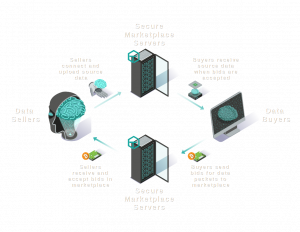What’s your data worth?…
by Anonymous | February 26, 2021
…asks Alexander McCaig, CEO of Tartle at the end of an introductory video on company’s website. According to Alex, commercial enterprises around the globe make billions of dollars every year by selling their customers’ data (McCaig, 2020). Revenues generated by sales to third parties likely pale in comparison to enterprise value created through primary use of data to generate customer insights with potential to increase revenues and lower costs. Despite providing consent, some customers may not be fully aware of of how and what type of data about them is being collected and whether or not it is being sold.
Data privacy laws passed in recent years (e.g. GDPR, CCPA) have provided consumers with better information and greater control over their data. The laws have forced private enterprises and public institutions to offer greater transparency into their data collection, processing, usage and selling practices. Regulators hope that these new laws will lead to an increase in general population’s awareness of how individuals’ data is being used. Furthermore, to the extent that policies are effective, customers are likely to attribute greater, but still unknown, value to their own data.
Tartle, along with a handful of other private companies, believes that data is a precious asset, the value of which can be determined in the open market. Tartle’s success in helping individuals monetize their data ‘asset’ through secure and far-reaching marketplace connecting eager buyers and motivated sellers, at scale, may give society a big hand in equalizing the data privacy playing field.

Ignorance is Bliss, Seduction is Powerful
In an earlier blog post, Robert Hosbach discusses the “privacy paradox,” a phrase used to describe the significant discrepancy between stated concerns about privacy and actions taken to protect it (R. Hosbach, 2021). Lack of action is attributable to a number of factors, with individual ignorance being a meaningful contributor. According to one paper, up to 73% of American adults believe that the presence of privacy policy implies that their data will not be misused (J. Turow et al, 2018). What further exaggerates complacency are deliberate efforts by commercial enterprises to lead consumers into a sense of resignation by relying on four tactics of seduction: placation, diversion, misnaming and using jargon (NA Draper et al, 2019). Consumers need more help, and society needs to do more.
Evolving Policy Landscape, the “Carrot” or the “Stick”
“The new privacy law is a big win for data privacy,” says Joseph Turow, a privacy scholar and professor of communication at the Annenberg School for Communication at the University of Pennsylvania (Knowledge@Wharton, 2019). While 2020 was viewed as a big year for privacy professionals, 2021 may even be bigger. In addition to California passing “CCPA 2.0” late last year, a large number of other states have proposed new legislation. Moreover, with new administration taking office in January, some privacy advocates hope that 2021 will be the year in which U.S. passes GDPR-like federal privacy legislation (Husch Blackwell LLP, 2021). Stricter privacy laws may serve as an effective “stick,” but where is the “carrot”?
“Change Brings Opportunity”
This famous quote by Nido Qubein is used frequently by business leaders facing uncertainty. While evolving regulatory frameworks are likely to disrupt businesses for the benefit of consumers, they are unlikely to slow exponential growth of data. One Mckinsey & Co study points to a 300% growth in IoT to 43 billion data producing devices by 2023 and a 7-fold increase in number of digital interactions by 2025 (McKinsey & Co, 2019). Evolving privacy laws, greater customer awareness, combined with our ever-increasing reliance on data have given birth to companies like Tartle. While motivated by financial gain, these companies are also purpose-driven with potential to reduce income inequality across the globe and put monetary value on individual’s data privacy. So, ask yourself what is your data worth to you, and would you be willing to sell it?
Sources
McCaig, Alexander. Tartle.co (2020, January 8). https://www.youtube.com/watch?v=rslKr3W-Ex8&feature=youtu.be
Maintaining Privacy in Smart Home. Hosbach, Robert (2021, February 19). Retrieved from https://blogs.ischool.berkeley.edu/w231/blog/
Turow, Joseph & Hennessy, Michael & Draper, Nora. (2018). Persistent Misperceptions: Americans’ Misplaced Confidence in Privacy Policies, 2003–2015. Journal of Broadcasting & Electronic Media. 62. 461-478. 10.1080/08838151.2018.1451867.
Draper NA, Turow J. The corporate cultivation of digital resignation. New Media & Society. 2019;21(8):1824-1839. doi:10.1177/1461444819833331
Your Data Is Shared and Sold…What’s Being Done About It?. Knowledge@Wharton (2019, October 28). Retrieved from https://knowledge.wharton.upenn.edu/article/data-shared-sold-whats-done/
The Year To Come In U.S. Privacy & Cybersecurity Law, Husch Blackwell LLP (2021, January 28). Retrieved from https://www.jdsupra.com/legalnews/the-year-to-come-in-u-s-privacy-9238400/
Growing opportunities in the Internet of Things, McKinsey & Co (2019, July 29). Retrieved from
https://www.mckinsey.com/industries/private-equity-and-principal-investors/our-insights/growing-opportunities-in-the-internet-of-things?cid=eml-web
